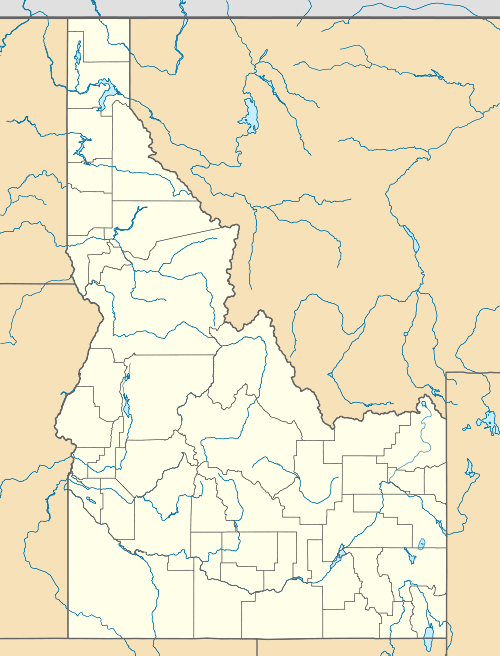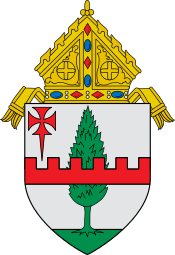Old Mission State Park
|
Cataldo Mission | |
|
The Sacred Heart Church | |
  | |
| Location | Cataldo, Idaho |
|---|---|
| Area | 22.9 acres (9.3 ha) |
| Built | 1848 |
| Architect | Antonio Ravalli |
| Architectural style | Greek Revival, Colonial, Other |
| NRHP Reference # | 66000312[1] |
| Significant dates | |
| Added to NRHP | October 15, 1966[1] |
| Designated NHL | July 4, 1961[2] |
The Silver Valley's Old Mission State Park is a state park and National Historic Landmark in North Idaho, USA. It is also known as the Mission of the Sacred Heart or Cataldo Mission. It contains the church itself, the parish house, and the surrounding property. Built 1850-53, Mission of the Sacred Heart is the oldest standing building in Idaho.
History
In the early 19th century, the Coeur d'Alene Indians had heard of these powerful "medicine men" in black robes with a book and wanted some of these men for their own tribe. They sent men east to St. Louis, and in 1842 Father Pierre-Jean De Smet responded to the request and came to the area. Fr. Nicholas Point and Br. Charles Duet came and helped to pick a mission location. The first was along the St. Joe River, but was subject to flooding. In 1846 they moved it to the current location.
In 1850 the church was taken over by Italian Jesuit missionary Antonio Ravalli, who began designing the new mission building. He made sure that the building was constructed by the Indians themselves, so that they could feel part of the church. It was built using the wattle and daub method, and finished some three years later without using a single nail.
The mission is named after Giuseppe Cataldo, a Sicilian priest born in the village of Terrasini, who spent most of his life in the frontier community.
In time the mission became an important stop for traders, settlers, and miners taking on the role as a hospitality and supply station. It was also a working port for boats heading up the Coeur d'Alene River.[3]
In 1961 it was designated a National Historic Landmark,[4] and in 1966 it was put on the National Register of Historic Places.[1]
Mission area
Church

Though they had few materials to decorate the church, they used ingenious techniques to beautify it. The walls were decorated with fabric bought from the Hudson's Bay Company and hand-painted newspaper that Fr. Ravalli had received in the mail. Tin cans were used to create an idea of chandeliers. Both wooden statues were carved by hand with nothing but a knife. The blue coloring of the interior wood is not paint but a stain created by pressing local huckleberries into the wood.

Parish house
After being burnt down, it was rebuilt in 1887. It is a two-story building, the upstairs used for sleeping quarters, and the downstairs for daily activities. It contains a smaller chapel, mostly used for daily mass.
Surrounding area
The surrounding property has two cemeteries, a nature trail, and a visitor's center.
See also
- List of the oldest churches in the United States
- List of National Historic Landmarks in Idaho
- National Register of Historic Places listings in Kootenai County, Idaho
References
- 1 2 3 National Park Service (2010-07-09). "National Register Information System". National Register of Historic Places. National Park Service.
- ↑ "Cataldo Mission". National Historic Landmark summary listing. National Park Service. Retrieved 2008-01-22.
- ↑ Idaho Department of Parks and Recreation. "The Coeur d'Alene's Old Mission State Park".
- ↑ National Historic Landmarks Program (NHL)
External links
| Wikimedia Commons has media related to Cataldo Mission. |
Coordinates: 47°32′57″N 116°21′40″W / 47.54917°N 116.36111°W
